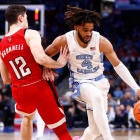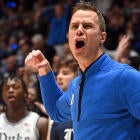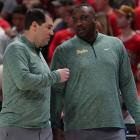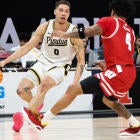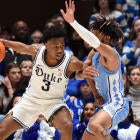LOS ANGELES -- The first time I saw LaQuinton Ross, he was an 8th-grader at a summer basketball camp, a lanky kid some had already labeled as the best prospect in his class. The next time I saw him, he had regressed into a borderline top-50 recruit. The next time I saw him, he was a frustrated freshman buried last season on Ohio State's bench.
That's basically the past six years of Ross' life summarized in three sentences.
| More on Arizona-Ohio State |
| Analysis |
 Jeff Borzello
Defense sparks Ohio State's game-changing run |
| Related links |
|
| Video |
| More college basketball coverage |
He was promising.
Then he was disappointing.
Then he was a total non-factor.
"And he was really frustrated," said Ohio State's Lenzelle Smith Jr. "But we just told him that if he didn't get on board, this team would move on without him."
So Ross had a decision to make -- either get on board or get lost in the shuffle. According to everybody connected to the Ohio State program, the Mississippi native decided to get on board, stop, as OSU point guard Aaron Craft put it, "rebelling" and work to become an important part of this team. And that approach is precisely what put Ross in a position to catch a pass Thursday from Craft here at Staples Center and bury a 3-pointer with 2.1 seconds remaining that broke a tie and lifted the Buckeyes to a 73-70 victory over Arizona in the Sweet 16 of the NCAA tournament.
And this should be a lesson to all young players everywhere. That success doesn't always come quickly. That the path to stardom isn't always as smooth as Kevin Durant's.
But fighting coaching, resisting hard work and running from adversity is rarely the answer even in this blame-everybody-else culture that dominates basketball at each level. Not getting enough shots in high school, find a new high school! AAU coach not using you right, find a new AAU team! College coach demanding you play defense and stop worrying about shots, transfer! NBA team underappreciating you, demand a trade!
That's basketball in 2013.
Credit Ross for bucking the trend.
If you would've watched him as an 8th-grader, you would've bet large amounts of money that Ross would be a first-round pick in the 2012 NBA Draft. He was already 6 feet 6. His future seemed as bright as any prospect's in recent memory, and then everything just sort of unraveled. At least one coach who recruited him early told me in 2010 that Ross looked more like a "mid-major player" than an NBA prospect. That might've been an exaggeration, but the fact that it was said is an indication of how far Ross had slipped.
Then came the academic problems.
That's what prevented Ross from enrolling in time. Consequently, he didn't join Ohio State until mid-December last season. Thad Matta, by then, already had his rotation set.
"Those first two months of the season are the most important months in terms of fundamentals," Matta said. "So when he got here, he was a little behind."
Which is why Ross only averaged 3.9 minutes per game as a freshman.
"I told him at one point, 'Look, I can't hold tryouts during the Big Ten because the league is too good,'" Matta said. "But, to his credit, he kept working."
On defense.
On offense.
On conditioning.
On everything.
"It's a process," said Greg Paulus, the former Duke point guard and current OSU video coordinator. "But when you're [ranked where Ross was ranked], you don't see yourself as having to deal with the process. You want it to be instantaneous. But it doesn't always work like that, and he realized that. He was frustrated. But he kept working."
And so Ross found himself early Thursday, sitting in the locker that's usually reserved for Kobe Bryant, getting ready for a game in which he eventually scored 17 points and grabbed one huge rebound in the closing minutes. Ross caught that final pass in rhythm, Craft yelled at him to "knock it down," and the sophomore sixth-man did exactly that to push the Buckeyes to within one win of their third Final Four in seven years.
From 8th-grade phenom.
To Big Ten benchwarmer.
To star of the West Regional at Staples Center.
It's been quite an interesting process for LaQuinton Ross.
That he stuck with it and matured has turned it into a nice story.
"Coming in my freshman year, I think I was kind of immature as far as my thinking," Ross acknowledged. "'Why am I not playing? Why am I not doing this?' But I think everything paid off. All the hard work is now paying off in this tournament."














